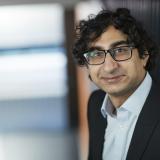| Authors | S. Ali |
| Title | Learning Digital Twin Models |
| Afilliation | Software Engineering |
| Project(s) | Department of Engineering Complex Software Systems, Co-Evolver: Uncertainty-Aware Coevolution Design of Self-Adaptive Cyber-Physical Systems, Co-tester: Collective-Adaptive Testing of Coevolving Autonomous Cyber-Physical Systems of Systems under Uncertainty |
| Status | Published |
| Publication Type | Talks, contributed |
| Year of Publication | 2022 |
| Location of Talk | Model-Driven Engineering of Digital Twins Seminar at Dagstuhl, Germany |
| Publisher | Schloss Dagstuhl, Germany |
| Abstract | Given that operational cyber-physical systems (CPS) produce continuous data, a complementary approach to model-based engineering is to learn digital twins models with machine learning techniques and providing functionalities such as predictions and anomaly detection. |
| Citation Key | 42665 |

